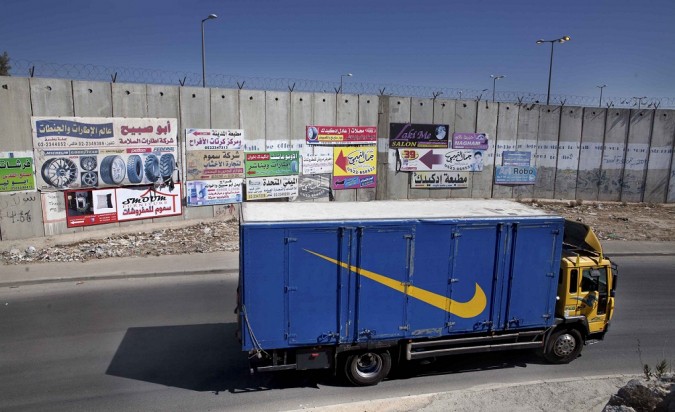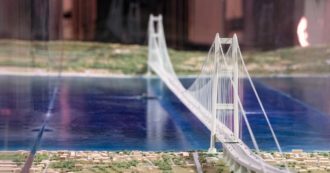In the last years, yet, he hasn’t been busy with Israel. Talks are frozen, only settlements aren’t: since Oslo, they have nearly doubled in size, they now stretch over 40 percent of the West Bank – Mustafa Barghouti’s main task is to negotiate between Hamas and Fatah. Because for Hamas, the only way to force Israel to a deal is not to build a state and to go to the Un: and least of all, to the International Criminal Court: where it would likely end up charged with war crimes – the only way is spreading fear. Firing rockets. Capturing soldiers. Attacking settlers. Yet, for young Palestinians there is no difference: it’s what they call ‘the double occupation’. The only moment of national unity, in the end, was in 2011, when they tried to follow in the footsteps of Tunisia and Egypt: and they were beaten up by Hamas in Gaza and Fatah in Ramallah.
“A third of the budget is allocated to security,” says Linah al-Saafin, 25 years old, who joined those rallies from the front row. “Rather than a peace process, this is a process of appeasement, with the complicity of the Palestinian Authority. Where ‘Authority’ stands for authoritarian, not for authoritative,” she complains. Like many of her peers, she doesn’t live anymore in Ramallah. She moved to London. Because if you stay here, you have no future. The most brilliant graduates, like Nidal Abu Maria, 26 years old, fluent English and a Ba in Business Management, make barely a living as tourist guides of the occupation, one offers the tour of checkpoints, another the tour of demolished homes. “And it’s hard. Because you know that we need it, I mean, we need to show the reality: because we need solidarity, international pressure on Israel: but it’s somehow humiliating,” he says. Walking around refugee camps as if they were a zoo. “The wealth you see is a deceit. A deceit and a trap. Our economy depends on Israel’s economy. Israel controls the borders, the infrastructure, it controls key resources like water – basically, it steers our economy toward sectors that complement its own. And it keeps it within strict boundaries. Because in Ramallah you can be a waiter, but not a biologist. It’s like living on a leash. Wealth, but not too much” – wealth enough to spread consumism: but to afford an iPhone, you sign for a 30 year mortgage. “A noose, rather than a leash,” he specifies. “Because then, to get the countless permits you need even to plant trees in your garden, and most of all, the permits you need to work in the public administration or in Israel, the only positions you can hope for, here, and we are talking of more than half of the Palestinians, you must refrain from political activism.” In other words: or you speak out, here, or you pay your mortgage rates.
The only empty area of Ramallah, not by chance, is the area of the Legislative Council. It hasn’t convened since 2007. Mahmoud Abbas governs basically alone from his presidential palace. He governs by decrees. His mandate expired in 2010. Jamal Jouma is 53 years old, and he is one of the masterminds of the kind of resistance born from the ashes, literally, 5,000 dead, of the Second Intifada. When Palestinians, tired of both Hamas and Fatah, took everything in their hands, and set up a grassroot network of popular committees. Since then, every friday the West Bank has been dotted by demonstrations against the Wall. Non violent demonstrations. “And for a while it’s been working. But in the end, we only achieved to tear down a small slice of the Wall, to move another slice a hundred meters away. Nothing more. The Wall is still standing, with its route which is twice the length of the border with Israel: and which is mostly inside the West Bank, 85 percent of it: dividing not Israelis from Palestinians, but Palestinians from Palestinians,” he says. And anyway, today on Friday, in Bi’lin, Ni’lin, Nabi Saleh, names now renowned, “it’s somehow a theatre performance where everybody plays his own role,” he admits.
At noon, twenty, thirty kids march toward the Wall amid the cameras of twenty, thirty foreign activists. Ten minutes later, tear gas canisters start to rain. Kids and activists withdraw of five meters. A break of ten minutes, and they advance of two meters: other tear gas canisters, they withdraw of other five meters. Another break. Half an hour, and the Israelis get tired: they turn to rubber bullets – or live ammo: and the rally is quickly over. “But it’s not a surrender, actually. It’s not because of a lack of interest. It’s because everything happens in a void of leadership. And without a strategy, nobody is willing to take risks. To get killed for nothing.” Because it doesn’t matter that Palestine doesn’t produce a single egg. That whatever you see, here, it’s just consumption, it’s the money of European donors, of Gulf sheiks: it isn’t growth and development. It doesn’t matter that this is not wealth, but debts. The Second Intifada, in the end, when Yasser Arafat was under siege, and there were not brand new cars around, but tanks, was yesterday.
The West Bank poverty rate was 75 percent. Gaza’s was 80 percent. Roughly the current poverty rate of East Jerusalem. 78 percent. And actually, it’s been months since media started talking about a new Intifada. Months since in East Jerusalem, suddenly, a Palestinian stabs an Israeli. Runs over bystanders with a car, with a bulldozer. Or opens random fire. But they are just lonely wolves. Young men in their twenties, with no political project, no coordination. Only endless frustration. In East Jerusalem there are now 200,000 settlers. Palestinians are 298,000.
And across the West Bank there are one, two, four casualties per week. Not enough, amid Syria, Iraq, Yemen, amid the Middle East bloodshed, to make the headlines. And anyway in Ramallah, in the meantime, it’s the usual summer. Fun and music and barbecues on the rooftops. The only ones to be mobilized, here, are the advertising screens. In between a sportscar and a Nivea cream, there is a destitute child. “Give a dollar for Gaza.”
Articolo Precedente
#Greferendum, la diretta twitter con gli inviati del Fatto ad Atene

Articolo Successivo
Calo nei sondaggi






